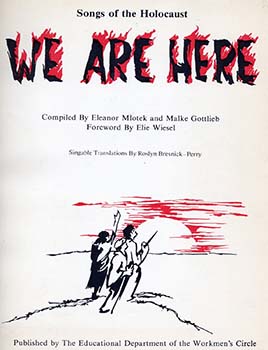A song written after the war which is often heard at commemorative gatherings. Words are by Joseph Papiernikov (1899-), who was born in Warsaw and who settled in Palestine in 1924. He was one of the pioneers of Yiddish poetry in Israel. Music is by Israel Alter (1901-1979), cantor, composer and professor of cantorial music at the Hebrew Union College in New York.

Under the little green Polish trees growing,
No more at play little Moyshelekh, Shloymelekh,
No more at play little Sorelekh, Leyelekh,
Not on the gentle grass, not when it’s snowing.
No more are young Jewish voices heard shouting,
Motelekh, Shimelekh, rascals carousing;
Battered and bruised with their woes so beguiling,
Strutting courageously, daring, delighting.
The little green trees in Poland are mourning,
Gone Jewish homes and their houses and dwellings,
Gone are old alleys, in shambles residing,
Children like little mice, scurrying, hiding.
Dear little children with eyes large and staring,
Black with a dark devastation enfolding.
Eyes full of fear, full of terror conveying
Despair, disaster beyond all comparing.
Under the little green Polish trees growing
No more at play little Moyshelekh, Shloymelekh,
No more at play little Sorelekh. Leyelekh,
Not on the gentle grass, not when it’s snowing.
Unter di poylishe grininke beymelekh
Shpiln zikh mer nit keyn Moyshelekh, Shloymelekh,
Shpiln zikh mer nit keyn Sorelekh, Leyelekh,
Nit af keyn grezelekh, nit af keyn shneyelekh.
S’hilkhn shoyn mer nit di yidishe shtimelekh
Fun di kundeysimlekh Motelekh, Shimelekh.
Mit di tsekrelte, tsedrapete tsurelekh,
Funem bavayzn vundeyrim un gvurelekh.
S’troyern atsind di poylishe beymelekh.
Toyt zenen yidishe heymen un heymelekh,
Toyt zenen geselekh, khorev di hayzelekh —
Vu es farshtekn zikh kinder. vi mayzelekh.
Yidishe kinder mit groyse eygelekh,
Shvartse azoy vi mit khoyshekh fartsoygene,
Eygelekh fule, mit pakhed farlofene,
Unter dem umglik, dem broynem — getrofene.
Unter di poylishe grininke beymelekh
Shpiln zikh mer nit keyn Moyshelekh, Shloymelekh,
Shpiln zikh mer nit keyn Sorelekh, Leyelekh,
Nit af keyn grezelekh, nit af keyn shneyelekh.
אונטער די פּױלישע גרינינקע בײמעלעך
שפּילן זיך מער ניט קײן משהלעך, שלמהלעך
שפּילן זיך מער ניט קײן שׂרהלעך, לאהלעך,
ניט אױף קײן גרעזעלעך, ניט אױף קײן שנײעלעך.
ס׳הילכן שױן מער ניט די ייִדישע שטימעלעך
פֿון די קונדסימלעך מאָטעלעך, שימעלעך.
מיט די צעקרעלטע, צעדראַפּעטע צורהלעך,
פֿונעם באַװײַזן װוּנדײרים און גבֿורהלעך.
ס׳טרױערן אַצינד די פּױלישע בײמעלעך.
טױט זײַנען ייִדישע הײמען און הײמעלעך,
טױט זײַנען געסעלעך, חרובֿ די הײַזעלעך —
װוּ עס פֿאַרשטעקן זיך קינדער, װי מײַזעלעך.
ייִדישע קינדער מיט גרױסע אײגעלעך,
שװאַרצע אַזױ װי מיט חושך פֿאַרצױגענע,
אײגעלעך פֿולע, מיט פּחד פֿאַרלאָפֿענע,
אונטער דעם אומגליק, דעם ברױנעם — געטראָפֿענע.
אונטער די פּױלישע גרינינקע בײמעלעך,
שפּילן זיך מער ניט קײן משהלעך, שלמהלעך,
שפּילן זיך מער ניט קײן שׂרהלעך, לאהלעך,
ניט אױף קײן גרעזעלעך, ניט אױף קײן שנײעלעך.
Song Title: Unter Di Poylishe Grininke Beymelekh

Compiled by sisters Malke Gottleib and Chana Mlotek, this collection of 40 songs, issued on the occasion of the 40th anniversary of the Warsaw Ghetto Uprising, reflects the suffering, despair, longing, as well as the strength, hope and courage that led the last remnant of enfeebled Jews to take up arms against the mammoth Nazi war-machine. Save for five songs, this compilation comprises songs that were actually written or sung in the ghettos and concentration camps. Four exceptions written after the war: “Babi Yar,” “Moyshelekh un Shloymelekh,” “Kadish,” and “Mayn mame hot gevolt zayn oyf mayn khasene” are often presented at commemorative gatherings and were therefore included. The fifth song “Am Yisroel Khay” was written in a D.P. camp and is an affirmation of the will of the survivors to build new lives for themselves, holding high their belief in the endurance of the Jewish people. To enable readers and singers not conversant with the Yiddish alphabet to utilize this collection, We Are Here! Songs of the Holocaust provides parallel transliterations and singable English translations by Roslyn Bresnick Perry.